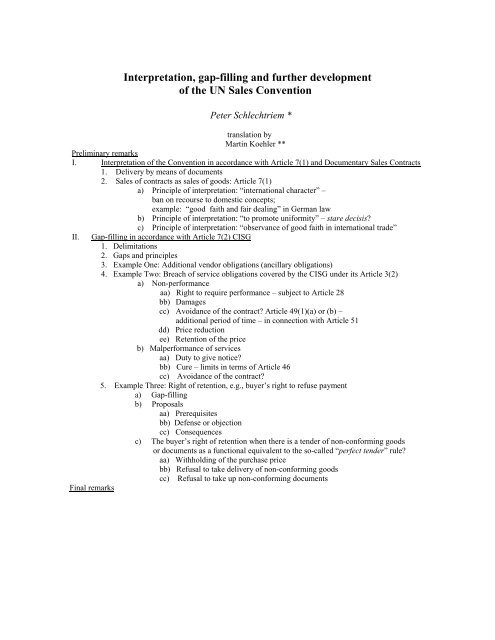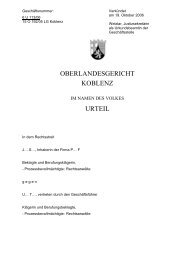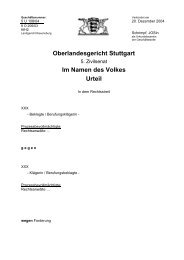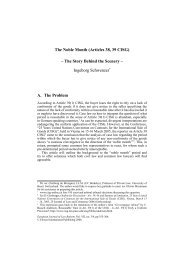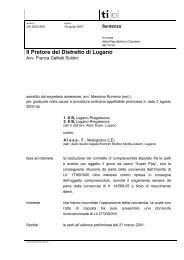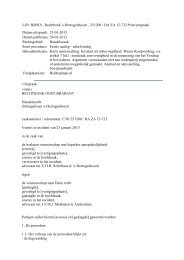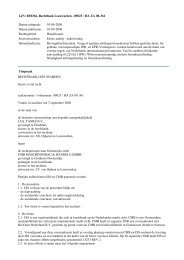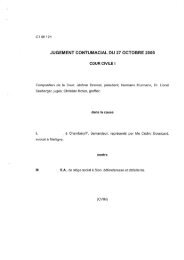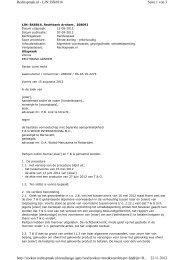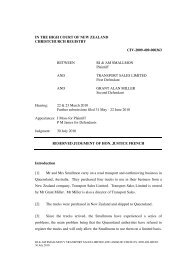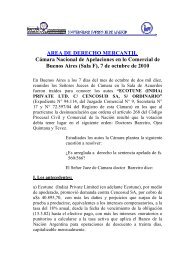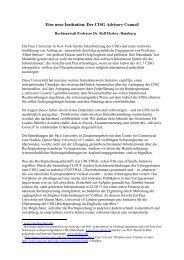CISG ? Interpretation, closing of loopholes and further development
CISG ? Interpretation, closing of loopholes and further development
CISG ? Interpretation, closing of loopholes and further development
You also want an ePaper? Increase the reach of your titles
YUMPU automatically turns print PDFs into web optimized ePapers that Google loves.
<strong>Interpretation</strong>, gap-filling <strong>and</strong> <strong>further</strong> <strong>development</strong><br />
<strong>of</strong> the UN Sales Convention<br />
Peter Schlechtriem *<br />
translation by<br />
Martin Koehler **<br />
Preliminary remarks<br />
I. <strong>Interpretation</strong> <strong>of</strong> the Convention in accordance with Article 7(1) <strong>and</strong> Documentary Sales Contracts<br />
1. Delivery by means <strong>of</strong> documents<br />
2. Sales <strong>of</strong> contracts as sales <strong>of</strong> goods: Article 7(1)<br />
a) Principle <strong>of</strong> interpretation: “international character” –<br />
ban on recourse to domestic concepts;<br />
example: “good faith <strong>and</strong> fair dealing” in German law<br />
b) Principle <strong>of</strong> interpretation: “to promote uniformity” – stare decisis?<br />
c) Principle <strong>of</strong> interpretation: “observance <strong>of</strong> good faith in international trade”<br />
II. Gap-filling in accordance with Article 7(2) <strong>CISG</strong><br />
1. Delimitations<br />
2. Gaps <strong>and</strong> principles<br />
3. Example One: Additional vendor obligations (ancillary obligations)<br />
4. Example Two: Breach <strong>of</strong> service obligations covered by the <strong>CISG</strong> under its Article 3(2)<br />
a) Non-performance<br />
aa) Right to require performance – subject to Article 28<br />
bb) Damages<br />
cc) Avoidance <strong>of</strong> the contract? Article 49(1)(a) or (b) –<br />
additional period <strong>of</strong> time – in connection with Article 51<br />
dd) Price reduction<br />
ee) Retention <strong>of</strong> the price<br />
b) Malperformance <strong>of</strong> services<br />
aa) Duty to give notice?<br />
bb) Cure – limits in terms <strong>of</strong> Article 46<br />
cc) Avoidance <strong>of</strong> the contract?<br />
5. Example Three: Right <strong>of</strong> retention, e.g., buyer’s right to refuse payment<br />
a) Gap-filling<br />
b) Proposals<br />
aa) Prerequisites<br />
bb) Defense or objection<br />
cc) Consequences<br />
c) The buyer’s right <strong>of</strong> retention when there is a tender <strong>of</strong> non-conforming goods<br />
or documents as a functional equivalent to the so-called “perfect tender” rule?<br />
aa) Withholding <strong>of</strong> the purchase price<br />
bb) Refusal to take delivery <strong>of</strong> non-conforming goods<br />
cc) Refusal to take up non-conforming documents<br />
Final remarks
PRELIMINARY REMARKS<br />
The uniform UN Sales Law, the <strong>CISG</strong>, was compiled <strong>and</strong> adopted in its final form at the United<br />
Nations Conference in Vienna in 1980, but preliminary work <strong>and</strong> forerunners had long been in<br />
existence reaching back to the 1930s <strong>and</strong> to the first drafts drawn up by Ernst Rabel for<br />
UNIDROIT, the Institute for the Unification <strong>of</strong> Private Law in Rome. Thus it is no surprise that<br />
the Convention, like national codifications, begins to show symptoms <strong>of</strong> aging. These are partly<br />
due to technical <strong>and</strong> economic <strong>development</strong>s which could not have been foreseen at the time the<br />
Convention was drafted – such as electronic commerce – <strong>and</strong> partly due to misjudgment <strong>of</strong> the<br />
practicality <strong>of</strong> certain provisions <strong>and</strong> their consequences. In particular, the acceptability <strong>of</strong> certain<br />
provisions <strong>of</strong> the <strong>CISG</strong> in countries with different basic structures <strong>of</strong> commercial law may have<br />
been overestimated, so that perhaps the resistance in Engl<strong>and</strong> to adoption <strong>of</strong> the Convention, <strong>and</strong><br />
the advice <strong>of</strong>ten given in practice to exclude the <strong>CISG</strong>’s application could have been (partly)<br />
induced by such misjudgments as to the acceptability <strong>of</strong> certain solutions <strong>and</strong> provisions <strong>of</strong> the<br />
Convention. 1 It is, however, certainly more difficult to implement corrections to or amendments<br />
<strong>of</strong> an international Convention than it is for a national legislator to reform national law since, at<br />
the international level, the cooperation <strong>of</strong> all parties to a Convention – i.e., all <strong>of</strong> the Contracting<br />
States <strong>and</strong> their legislative organs – is necessary. In the case <strong>of</strong> the <strong>CISG</strong>, such a process can only<br />
be seen as hopeless when one considers the length <strong>and</strong> difficulty <strong>of</strong> its labor pains. One should<br />
therefore be on the lookout for Convention-internal provisions that allow for adaptation <strong>and</strong><br />
<strong>further</strong> <strong>development</strong> <strong>of</strong> the <strong>CISG</strong> <strong>and</strong> the construction <strong>of</strong> bridges to other legal systems – such as<br />
the way in which, in German <strong>and</strong> in Swiss law, certain general clauses have kept the enacted<br />
Codes <strong>of</strong> these countries <strong>and</strong> their basically rigid texts flexible <strong>and</strong> thus have long forestalled the<br />
need for intervention <strong>of</strong> the legislature. Further, the legal-technical tools <strong>of</strong> broader interpretation<br />
<strong>of</strong> the text <strong>and</strong> <strong>of</strong> analogy have made it possible to <strong>of</strong>fset weaknesses <strong>and</strong> gaps in the respective<br />
Codes.<br />
In the <strong>CISG</strong> it is, in particular, the two paragraphs <strong>of</strong> Article 7 which provide the mechanism for<br />
resolving interpretive issues <strong>and</strong> allowing <strong>further</strong> <strong>development</strong> <strong>of</strong> the Convention. The distinction<br />
between the scope <strong>of</strong> paragraph (1) <strong>and</strong> the scope <strong>of</strong> paragraph (2) is important in each case, but<br />
can also be unclear. For instance, when dealing with electronic communication <strong>of</strong> legally relevant<br />
statements, pr<strong>of</strong>ound theoretical considerations can turn on whether, according to the principles<br />
* This is a translation <strong>and</strong> adaptation <strong>of</strong> the text “Auslegung, Lückenfüllung und Weiterentwicklung” read at<br />
a symposium in honor <strong>of</strong> Pr<strong>of</strong>essor Dr. Dr. h.c. Frank Vischer in Basel, May 11, 2004. For the symposium<br />
presentation, see .<br />
The author Peter Schlechtriem, Dr. iur. (U. <strong>of</strong> Freiburg), Dr. h.c. (U. <strong>of</strong> Basel), Dr. hc. (U. <strong>of</strong> Tartu), M.C.L.<br />
(U. <strong>of</strong> Chicago) is Pr<strong>of</strong>essor Emeritus <strong>of</strong> the University <strong>of</strong> Freiburg, Germany, <strong>and</strong> is at present Head <strong>of</strong><br />
the Center <strong>of</strong> Research on the Unification <strong>of</strong> the European Law <strong>of</strong> Obligations at the University <strong>of</strong><br />
Freiburg.<br />
** The author thanks Martin Koehler for having provided a first translation. He is deeply indebted to his<br />
colleague Pr<strong>of</strong>essor Albert H. Kritzer, Pace University School <strong>of</strong> Law, N.Y., for his continuous, patient<br />
review <strong>of</strong> the various draft translations <strong>and</strong> for his many helpful suggestions <strong>and</strong> proposals in regard to the<br />
subject matter <strong>of</strong> the topics dealt with in this article.<br />
1 Cf. Tom McNamara, U.N. Sale <strong>of</strong> Goods Convention: Finally Coming <strong>of</strong> Age?, 2003 Colorado Lawyer,<br />
10-22, 10 et seq.
<strong>of</strong> Article 7(1), one attempts to base <strong>further</strong> <strong>development</strong> <strong>of</strong> the Convention on an interpretation<br />
<strong>of</strong> the individual provisions on declarations <strong>and</strong> their communication – <strong>of</strong>fer, acceptance,<br />
revocation, avoidance, reduction, notice <strong>of</strong> defects, etc. – or, alternatively, whether one seeks to<br />
form a gap-filling uniform rule in terms <strong>of</strong> Article 7(2). But that is perhaps <strong>of</strong> little interest in<br />
practice <strong>and</strong>, in my opinion, should therefore not be overrated; also, the comprehension <strong>and</strong><br />
application <strong>of</strong> the <strong>CISG</strong> elsewhere, particularly in Anglo-Saxon legal circles, are less controlled<br />
by theory <strong>and</strong> methodology than is the case with Civilians. In any event, it rather always depends<br />
on each individual case. I therefore do not wish to provide abstract advice; I will instead consider<br />
individual issues.<br />
I. INTERPRETATION OF THE CONVENTION IN TERMS OF<br />
ARTICLE 7(1) AND DOCUMENTARY SALES CONTRACTS<br />
1. DELIVERY BY MEANS OF DOCUMENTS<br />
In critical analyses <strong>of</strong> the <strong>CISG</strong> in Anglo-Saxon literature, it is <strong>of</strong>ten deplored that the<br />
Convention does not take into account the peculiarities <strong>of</strong> commodity trade <strong>and</strong> thereby, in<br />
particular, those <strong>of</strong> documentary sales <strong>of</strong> commodities, 2 which, in the light <strong>of</strong> the significance <strong>of</strong><br />
these forms <strong>of</strong> transactions – “the volume <strong>of</strong> paper trading greatly exceeds the volume <strong>of</strong><br />
dealings in the underlying goods” 3 – is regarded as a major deficit <strong>of</strong> the <strong>CISG</strong>. In this<br />
connection, there is also criticism that the regulations <strong>of</strong> the Convention are too lenient in cases<br />
<strong>of</strong> breach, which “might not suit the harsher environment <strong>of</strong> international commodity sales.” 4<br />
They are (in particular) said to be unsuitable for losses in markets with strongly fluctuating<br />
prices, which are completely different from losses caused by defects in goods such as shoes or<br />
specially designed machines. 5 Finally, the Convention’s regime on passing <strong>of</strong> risk is said to have<br />
an upsetting effect on the rules on risk contained in FOB <strong>and</strong> CIF contracts in the commodities<br />
trade. 6<br />
The thrust <strong>of</strong> these critical opinions regarding the suitability <strong>of</strong> the <strong>CISG</strong> must come as a surprise<br />
as, for Ernst Rabel, trade in commodities <strong>and</strong> the applicable forms <strong>and</strong> contract-types such as CIF<br />
or FOB were always present in his preparation <strong>of</strong> the foundations for the legal unification <strong>of</strong> the<br />
transnational sale <strong>of</strong> goods in his magnum opus “Recht des Warenkaufs.” 7 8 In using the term<br />
2 Cf. Alastair Mullis, Avoidance for Breach under the Vienna Convention; A Critical Analysis <strong>of</strong> some <strong>of</strong> the<br />
Early Cases, in: Andreas & Jarborg (eds.), Anglo-Swedish Studies in Law, Lustus Forlag (1998), p. 326 et<br />
seq.<br />
3 Mullis, op. cit. (previous footnote), p. 329, quoting a study by Bridge.<br />
4 Bridge, The International Sale <strong>of</strong> Goods: Law <strong>and</strong> Practice, Oxford University Press 1999, margin note<br />
2.41.<br />
5 Mullis, op. cit., p. 328.<br />
6 Bridge, op. cit.<br />
7 Ernst Rabel, Recht des Warenkaufs, Vol. 1 1936, Vol. 2 1958.<br />
8 Cf. Rabel , op. cit. (previous footnote), Vol. 1, p. 38 et seq., who takes into account the already<br />
mentioned special characteristics <strong>of</strong> the trade in commodities by means <strong>of</strong> documents, that are said to<br />
st<strong>and</strong> in the way <strong>of</strong> the unification <strong>of</strong> law – primarily by dealing with the argument that the worldwide trade
“goods”, Rabel relied on the English Sale <strong>of</strong> Goods Act <strong>and</strong> the then-in-effect (U.S.) Uniform<br />
Sales Act; 9 the extension <strong>of</strong> the scope <strong>of</strong> application <strong>of</strong> the Uniform Sales Law to – e.g. –<br />
specially produced machinery was, on the other h<strong>and</strong>, more <strong>of</strong> a completion. 10 Also, the experts<br />
<strong>of</strong> the Anglo-Saxon legal community from H.C. Gutteridge to Soia Mentschik<strong>of</strong>f, Barry Nicholas,<br />
John Honnold <strong>and</strong> Allan Farnsworth, who had participated to a large extent in the unification <strong>of</strong><br />
Sales Law up until <strong>and</strong> during the Vienna Conference in 1980, could hardly have ignored these<br />
forms <strong>of</strong> the international sale <strong>of</strong> goods <strong>and</strong> the peculiarities <strong>of</strong> their own legal systems in this<br />
area; indeed, the report <strong>of</strong> the UNCITRAL Secretariat, drawn up in preparation <strong>of</strong> the Vienna<br />
Conference, expressly states that documentary sales <strong>of</strong> goods shall be covered by the Convention,<br />
“though in some legal systems such sales may be characterized as sales <strong>of</strong> commercial paper.” 11<br />
Regarding any criticism <strong>of</strong> the existence <strong>of</strong> discrepancy or even conflict between the <strong>CISG</strong> <strong>and</strong><br />
INCOTERMS, such criticism probably fails to take fully into account Article 6 <strong>and</strong> the<br />
established primacy <strong>of</strong> the agreement between the parties which is set forth therein. Of course,<br />
clauses such as FOB or CIF have priority over the provisions <strong>of</strong> the <strong>CISG</strong> – in particular, with<br />
respect to the passing <strong>of</strong> risk. 12 The particular risk <strong>of</strong> loss from extreme price fluctuations on the<br />
international commodity markets is comparable 13 <strong>and</strong>, even if the matter is not regarded as<br />
expressly settled by the provisions <strong>of</strong> the Convention, it might be regulated by relevant clauses in<br />
the contract, or adequately defined by interpretation <strong>of</strong> the contract pursuant to Article 8(2), (3).<br />
in commodities is supposed to have created its own commercial law stipulated in model forms, what was<br />
even then expressed mainly by Großmann-Doerth in his renowned “Das Recht des Überseekaufs”,<br />
Mannheim-Berlin-Leipzig, 1930. It must be generally remembered here that Rabel extensively evaluated<br />
the consequences <strong>of</strong> such forms <strong>and</strong> practices to international trade in commodities <strong>and</strong>, in addition, the<br />
problems <strong>of</strong> non-conforming tender <strong>of</strong> goods or documents (see <strong>further</strong> in text) compiled <strong>and</strong> evaluated by<br />
Großmann-Doerth – also in his monograph “Die Rechtsfolgen vertragswidriger Andienung”, Marburg<br />
1934. The discussion with the Anglo-Saxon critics <strong>of</strong> the <strong>CISG</strong> seems therefore at times to be a<br />
continuation <strong>of</strong> the dialog between Rabel <strong>and</strong> Großmann-Doerth.<br />
9 S. Rabel, op. cit., p. 55.<br />
10 Cf. Rabel, op. cit., p. 44.<br />
11 Commentary on the Draft Convention on Contracts for the International Sale <strong>of</strong> Goods, prepared by the<br />
Secretariat, Document A/CONF.97/5, dated 14 March 1979. p. 13, para. 8 <strong>of</strong> Commentary on Article 2<br />
[Exclusions from Convention].<br />
12 Cf. here too Rabel, op.cit. p. 46 et seq. no one intends to curtail party autonomy; for <strong>further</strong> details on<br />
priority <strong>of</strong> trade terms p. 56 et seq.; see too McNamara, op. cit. (fn. 1), p. 18, who finds an interpretation<br />
clause lacking in the <strong>CISG</strong>. For an example <strong>of</strong> the unproblematic h<strong>and</strong>ling <strong>of</strong> a CIF clause in a <strong>CISG</strong><br />
contract, see the USA case St. Paul Guardian Insurance Co. <strong>and</strong> Travelers Insurance Co. v. Neuromed<br />
Medical Systems & Support, GmbH, S.D.N.Y. 26 March 2002, <strong>CISG</strong>-online no. 615, 2002 U.S. Dist.<br />
LEXIS 5096, 2002 WL 465312 (S.D.N.Y.); also particularly interesting, because it concerns a commodity<br />
sale, see the German ruling in Oberl<strong>and</strong>esgericht [Appellate Court] Hamburg <strong>of</strong> 28 February 1997, <strong>CISG</strong>online<br />
no. 261, Forum des Internationalen Rechts / The International Legal Forum 2 (1977) 168-171 =<br />
Forum [English Language Edition] 2 (1977) 166-170: CIF clause as an indication that time was <strong>of</strong> the<br />
essence.<br />
13 In this respect too Großmann-Doerth, Überseekauf (Fn. 8 above), p. 259 et seq.; <strong>and</strong> – Die<br />
Rechtsfolgen vertragswidriger Andienung (fn. 8 above) –, p. 104 et seq. <strong>and</strong> p. 185 et seq: The central<br />
point <strong>of</strong> the problem <strong>of</strong> choosing between avoidance <strong>and</strong> a second tender is the market fluctuations in the<br />
commodities trade.
For example, it is to be understood that (delivery by) the h<strong>and</strong>ing over <strong>of</strong> the documents by a<br />
certain deadline fixed by or determinable from the contract would be “<strong>of</strong> the essence” for the<br />
buyer.<br />
In my opinion, the only doubts that merit consideration are, that for international purchasers <strong>of</strong><br />
commodities very <strong>of</strong>ten it is not the goods as such, i.e., the actual raw materials, etc. that are most<br />
relevant to the deal, but the documents embodying the contract <strong>and</strong>/or resulting from the contract,<br />
the latter <strong>of</strong>ten being provided by the first seller – such as the producer 14 – so that – according to<br />
the report <strong>of</strong> the UNCITRAL Secretariat quoted above – in some legal systems this transaction is<br />
not regarded as a sale <strong>of</strong> goods, but as a sale <strong>of</strong> documents. One must, in this respect, differentiate<br />
– at least in the Swiss <strong>and</strong> German legal systems – between various legal forms:<br />
First case<br />
Firstly, the goods can be sold as such <strong>and</strong> a surrogate for their delivery in the form <strong>of</strong> a<br />
document, which embodies the rights to delivery <strong>of</strong> the goods, can be agreed upon.<br />
Second case<br />
Secondly, such a document can itself be the object <strong>of</strong> a contract <strong>of</strong> sale. In other words, instead <strong>of</strong><br />
100,000 barrels <strong>of</strong> crude oil <strong>of</strong> the kind West Texas Intermediate, documents – whether in paper<br />
or electronic form – which entitle the rightful holder to dem<strong>and</strong> delivery <strong>of</strong> that amount <strong>of</strong> oil <strong>of</strong> a<br />
specified category, could be traded as such, in particular, therefore, such documents as<br />
“Warenpapiere” in the sense <strong>of</strong> § 925 ZGB (Swiss Civil Code). 15 And those documents are<br />
<strong>of</strong>ten traded onwards in string transactions, i.e., sold <strong>and</strong> transferred several times until the end<br />
purchaser finally takes delivery <strong>of</strong> the physical goods. The obligations <strong>of</strong> the seller <strong>and</strong> his<br />
liability for the performance <strong>of</strong> the contract are, in such contracts, no longer primarily linked to<br />
the physical condition <strong>of</strong> the goods – in so far as the contract <strong>of</strong> sale does not contain additional<br />
specific terms in this respect 16 – <strong>and</strong> their delivery, but also to the timely transfer <strong>of</strong> the<br />
documents <strong>and</strong> their conformity with the stipulations <strong>of</strong> the seller’s obligations in the contract <strong>of</strong><br />
sale. If the documents identify the goods to be delivered in accordance with their designation <strong>and</strong><br />
description in the contract <strong>of</strong> sale, then the seller has complied, as he has provided the buyer with<br />
rights <strong>of</strong> access to goods “<strong>of</strong> the quantity, quality <strong>and</strong> description required by the contract” –<br />
Article 35(1) – <strong>and</strong> has therefore performed in accordance with the terms <strong>of</strong> the contract.<br />
Discrepancies between the physical condition <strong>of</strong> the goods <strong>and</strong> their description in the relevant<br />
documents can lead to liability <strong>of</strong> the issuer <strong>of</strong> the documents obliged to h<strong>and</strong> over the goods in<br />
accordance with the terms <strong>of</strong> the documents – e.g., the warehouse, the carrier, etc. – but not the<br />
14 For the possible constellations in this respect in a <strong>CISG</strong> contract, see the informative Bridge,<br />
International Sale <strong>of</strong> Goods, Oxford 1999, margin note 5.05.<br />
15 ZGB = Schweizerisches Zivilgesetzbuch [Swiss Civil Code]. Hereto <strong>and</strong> to the following in Schweizer<br />
Recht Honsell/Koller, Basler Kommentar zum Schweizerischen Privatrecht, Art. 184 margin note 56.<br />
16 Cf. Bridge, op. cit. (fn. 4 above) the sample contracts printed in appendices 1 <strong>and</strong> 2 for contracts <strong>of</strong> sale<br />
FOSFA Contract No. 53 (Vegetable <strong>and</strong> Marine Oil – FOB <strong>and</strong> GAFTA contract No. 100 (Feeding stuffs in<br />
Bulk – CIF).
seller, in so far as the contract does not contain any additional undertakings relating to the quality<br />
<strong>of</strong> the physical goods, 17 or in exceptional cases <strong>of</strong> fraud or other fraudulent conduct.<br />
The documents which enable such an “onward trading”, can be variously regulated in the national<br />
legal systems, <strong>and</strong> can grant the rightful holder rights <strong>of</strong> varying “strength”. So-called<br />
“Traditionspapiere” – in German <strong>and</strong> Swiss domestic law – “represent” possession 18 <strong>and</strong> their<br />
transfer in the form allowed under the relevant laws on property <strong>and</strong> negotiable instruments<br />
effects a transfer <strong>of</strong> possession <strong>and</strong> possibly ownership to their acquirer: their transfer is the<br />
“delivery” which the seller has undertaken, <strong>and</strong> this can, <strong>of</strong> course, take place repeatedly before<br />
the final customer himself dem<strong>and</strong>s h<strong>and</strong>ing over, i.e., the physical possession <strong>of</strong> the goods.<br />
Documents other than those papers also allow onward trading without the intermediaries<br />
acquiring direct possession <strong>of</strong> the goods, such as so-called delivery notes, i.e., orders to a<br />
warehouse in which the seller <strong>of</strong> first instance has stored the goods <strong>and</strong> which has to h<strong>and</strong> them<br />
over to the end buyer, who presents the note, on payment <strong>of</strong> the storage costs, the purchase price,<br />
etc. Here too, the point is, notwithst<strong>and</strong>ing all legal-technical details <strong>of</strong> the law <strong>of</strong> these<br />
instruments to which the national laws governing these papers applies, that ultimately “delivery”<br />
by means <strong>of</strong> the transfer <strong>of</strong> vested rights to delivery contained in documents, perhaps even<br />
resulting in the transfer <strong>of</strong> ownership in the physical goods, is achieved, even when a layman is<br />
not aware that the document, be it a bill <strong>of</strong> lading, a warehouse receipt, a delivery note, etc., in<br />
the first instance vests only the rights to delivery <strong>of</strong> the goods <strong>and</strong> only in the end the commercial<br />
result <strong>of</strong> the transaction – or <strong>of</strong> a string <strong>of</strong> transactions – will be the access to the physical goods<br />
provided by these documents.<br />
In the interpretation <strong>of</strong> the <strong>CISG</strong> in accordance with the guidelines recited in Article 7(1) (more<br />
hereto following), these trading forms, although they are effected by the transfer <strong>of</strong> “rights”<br />
embodied in documents <strong>and</strong> therefore presuppose corresponding obligations <strong>of</strong> the seller, are<br />
governed by the provisions <strong>of</strong> the Convention – see, in particular, Articles 30 <strong>and</strong> 34 – even<br />
though the 1964 Hague Sales Convention (ULIS) was clearer in this respect, in particular with<br />
regard to the legal consequences <strong>of</strong> breach <strong>of</strong> the relevant seller’s obligations, cf. Articles 18, 50,<br />
51 ULIS. 19 In particular, such trade forms <strong>and</strong> objects <strong>of</strong> sale are not excluded from the scope <strong>of</strong><br />
the <strong>CISG</strong> on the grounds <strong>of</strong> its Article 2(d). 20 The critical reservations regarding the <strong>CISG</strong> that it<br />
primarily regulates “consignments <strong>of</strong> shoes … or sales <strong>of</strong> tractors” <strong>and</strong>, therefore, must be<br />
17 See the examples in the previous footnote.<br />
18 It is not necessary <strong>and</strong> possible to go into the various legal dogmatic explanations <strong>of</strong> this<br />
“representation effect“ here, cf. Schweizer Recht Honsell/Koller, Article 925 ZGB, margin note 17; for the<br />
abundance <strong>of</strong> German theories Zöllner, Wertpapierrecht, 14th ed., C.H. Beck, München 1987;<br />
MünchKom/Dubischar, HGB Vol. 7 (Transportrecht), C.H. Beck, München 1997, § 450 HGB, margin note<br />
2.<br />
19 For the reasons for this scarcity in the <strong>CISG</strong>, see Honnold, Uniform Law for International Sales, Kluwer<br />
Law International, 3d ed. 1999, margin note 219: “The first sentence <strong>of</strong> the present article was included to<br />
provide a simpler <strong>and</strong> less cluttered text” instead <strong>of</strong> “many references to delivery by documents”.<br />
20 See instead Ferrari in Schlechtriem/Schwenzer (ed.), Kommentar zum Einheitlichen Kaufrecht, 4th ed.,<br />
C.H. Beck München 2004, Sect 2 margin note 34; equally, Schlechtriem, Einheitliches UN-Kaufrecht,<br />
Mohr (Siebeck), Tübingen 1980, p. 15 with reference to the report <strong>of</strong> the UNCITRAL Secretariat p. 40 sub.<br />
8.
egarded as not suitable for the customary document trading on the international commodity<br />
markets 21 are, in my opinion, caused by a lack <strong>of</strong> familiarity with the Convention <strong>and</strong> the<br />
possibilities which it allows for party autonomy in contracts. The same applies to the numerous<br />
calls to consequently exclude the application <strong>of</strong> the Convention from the realm <strong>of</strong> commodity<br />
sales on the ground that the <strong>CISG</strong> is not suited to them. It must be freely admitted that Germanlanguage<br />
literature seldom devotes to documentary sales the detailed analysis this subject<br />
requires 22 <strong>and</strong> limits itself in particular to the function <strong>of</strong> certain papers as a transfer surrogate, 23<br />
neglecting, however, the repercussions <strong>of</strong> a documentary sale agreement on the obligations <strong>of</strong> the<br />
seller. 24<br />
Third case<br />
The third conceivable case is questionable: Not (only) documents such as bills <strong>of</strong> ladings,<br />
warehouse receipts, delivery notes, etc., <strong>and</strong> thereby rights <strong>of</strong> the holder <strong>of</strong> the documents to the<br />
h<strong>and</strong>ing over <strong>of</strong> the goods, are traded, but sales contracts as such, to be legally precise: the rights<br />
<strong>of</strong> buyers under their sales contracts to have the goods delivered <strong>and</strong> ownership transferred are<br />
the object <strong>of</strong> these sales..<br />
Under the scrutiny <strong>of</strong> the jurist, such a contract arguably involves the sale <strong>of</strong> rights, which are<br />
actually excluded from the scope <strong>of</strong> the <strong>CISG</strong>. 25 But are they really? In this respect, the<br />
Convention must be interpreted <strong>and</strong>, in particular in respect <strong>of</strong> this constellation, i.e., the purchase<br />
<strong>of</strong> contracts, the principles <strong>of</strong> interpretation contained in Article 7(1) are significant.<br />
2. SALES OF CONTRACTS AS SALES OF GOODS: ARTICLE 7(1)<br />
Article 7(1) stipulates three directives to interpretation. It does so in a st<strong>and</strong>ard formula which<br />
has since been applied in many other Conventions on the Unification <strong>of</strong> Law. 26<br />
21 Mullis, op. cit. (fn. 2), p. 328.<br />
22 An excellent treatment is, however, <strong>of</strong>fered by the commentary <strong>of</strong> Witz/Salger/Lorenz, International<br />
Einheitliches Kaufrecht, Verlag Recht und Wirtschaft, Heidelberg 2000; in contrast, however, some<br />
commentaries do not even contain any reference to document trading in the index.<br />
23 Detailed in respect <strong>of</strong> many, cf. for example Piltz, Internationales Kaufrecht, C.H. Beck, München 1993,<br />
§ 3, margin note 76 et seq.<br />
24 These questions are, however, addressed in the treatment <strong>of</strong> the problem whether the buyer must<br />
object by notice <strong>of</strong> lack <strong>of</strong> conformity, cf. thereto Staudinger/Magnus, Article 34 margin note 18;<br />
Schlechtriem/ Schwenzer/Huber/Widmer, op. cit. (fn. 20) Article 34 margin note 5 – in my opinion, a<br />
reference here to an analogous application <strong>of</strong> Articles 38, 39 does not suffice; instead the object <strong>of</strong> the –<br />
breached – seller’s obligation should have been more exactly specified.<br />
25 Cf. In the commentary literature on the exclusion <strong>of</strong> Contracts <strong>of</strong> Sale regarding rights <strong>and</strong> the provision<br />
there<strong>of</strong> instead Schlechtriem/Schwenzer/Ferrari, op. cit. (fn. 20) Article 1, margin note 36.<br />
26 Cf. Convention on Agency in the International Sale <strong>of</strong> Goods dated 8 February 1983 (Geneva), Article<br />
6(1); UNIDROIT Convention on International Factoring dated 28 May 1988 (Ottawa), Article 6(1);<br />
UNIDROIT Convention on International Financial Leasing dated 20 May 1988 (Ottawa), Article 6(1); UN<br />
Convention on the Assignment <strong>of</strong> Receivables in International Trade, dated 12 December 2001, Article<br />
7(1); see <strong>further</strong> UNIDROIT – Principles <strong>of</strong> International Commercial Contracts, 2004, Article 1.6.
a) Principle <strong>of</strong> interpretation: “international character” –<br />
a ban on recourse to domestic concepts; as an<br />
example, “good faith <strong>and</strong> fair dealing” in German law<br />
Proper interpretation <strong>of</strong> the Convention should take into account “its international<br />
character”. This is what is meant by the so-called autonomous interpretation, i.e., an<br />
underst<strong>and</strong>ing <strong>and</strong> interpretation <strong>of</strong> the Convention which must detach itself from national<br />
preconceptions <strong>of</strong> the terms applied. 27 Autonomous interpretation <strong>of</strong> the Convention is <strong>of</strong>ten<br />
proposed, but is at the same time <strong>of</strong>ten neglected, as it is only natural that the reader, interpreter<br />
or applier <strong>of</strong> the Convention brings his ingrained preconceptions <strong>of</strong> his own laws to his<br />
interpretation. The requisite “international underst<strong>and</strong>ing” in itself raises doubts whether the<br />
finely drawn difference between the sale <strong>of</strong> “goods” as such <strong>and</strong> an obligation <strong>of</strong> supply arising<br />
from this contract <strong>of</strong> sale, perhaps to transfer documented rights to surrender possession, on the<br />
one h<strong>and</strong>, <strong>and</strong> the purchase <strong>of</strong> the rights to delivery, i.e., a purchase <strong>of</strong> contracts, on the other<br />
h<strong>and</strong> – a distinction that might be extremely difficult to explain to a non-jurist who trades – <strong>and</strong><br />
perhaps speculates – on the commodities market. This is every reason for equal treatment, i.e., for<br />
treating sales <strong>of</strong> contracts as sales <strong>of</strong> goods under the Convention.<br />
b) Principle <strong>of</strong> interpretation: “to promote uniformity” – stare decisis?<br />
The second directive contained in Article 7(1), i.e., “to promote uniformity in [the]<br />
application [<strong>of</strong> the Convention]” would be better met, if one were to apply the Convention to all<br />
documentary sales independently <strong>of</strong> whether the contract documents to be transfered embody<br />
sales contracts or vest rights to supply goods or to their h<strong>and</strong>ing over. Besides, this interpretation<br />
guideline is an important anchor for international case law as a source <strong>of</strong> law, even if a fully<br />
developed doctrine <strong>of</strong> stare decisis is neither expected nor desired. But the requisite consideration<br />
<strong>of</strong> decisions <strong>of</strong> courts in other Contracting States (particularly where there is an established line<br />
<strong>of</strong> rulings) by courts which are later faced with the same issue, <strong>and</strong> the <strong>development</strong> <strong>of</strong> a<br />
technique <strong>of</strong> distinguishing, could have its Convention internal basis in this interpretation<br />
directive.<br />
c) Principle <strong>of</strong> interpretation: “observance <strong>of</strong> good faith in international trade”<br />
After all, as the third directive laid down in Article 7(1), “to observe good faith in<br />
international trade”, no matter how unsure the meaning <strong>of</strong> “good faith in international trade”<br />
may be, 28 argues against interpreting the Convention in such a way that even though the sale<br />
27 For an example <strong>of</strong> an interpretation that fails to detach itself from national preconceptions <strong>of</strong> terms<br />
applied, see the use <strong>of</strong> domestic case law – case law under UCC § 2-615 – to interpret Article 79 <strong>of</strong> the<br />
<strong>CISG</strong> in Raw Materials Inc. v. Manfred Forberich GmbH & Co. KG, 2004 U.S. Dist. LEXIS 12510, 2004<br />
WL 1535839 (N.D.Ill), available on the Internet at .<br />
28 To the question whether this formula corresponds with the German legal principle <strong>of</strong> "Treu und<br />
Glauben“, <strong>and</strong> whether it is only a matter <strong>of</strong> a principle for the interpretation <strong>of</strong> the Convention, or a<br />
directive for the interpretation <strong>of</strong> the contractual relationship between the parties, cf. my commentary in<br />
Schlechtriem/Schwenzer, Commentary on the UN Convention on the International Sale <strong>of</strong> Goods,<br />
Clarendon Press, 2d ed. Oxford 2005, Article 7, Rn: 17 et seq. (to be published in 2005).
agreement for the transfer surrogates – in the form <strong>of</strong> vested rights <strong>of</strong> surrender against carriers or<br />
warehouse owners – falls within the Convention’s scope, the purchase <strong>of</strong> a contract <strong>of</strong> sale <strong>and</strong><br />
the established rights <strong>of</strong> delivery therein, does not.<br />
Certainly, the critics’ misgivings regarding the application <strong>of</strong> the <strong>CISG</strong> to the commodities trade<br />
are not based only on the herein-mentioned juristic borderlines drawn between the purchase <strong>of</strong><br />
goods <strong>and</strong> the purchase <strong>of</strong> contractual rights, but also – although without any real concrete<br />
substantiations – on the assertion that the regulation by the Convention <strong>of</strong> the rights <strong>and</strong><br />
obligations <strong>of</strong> the parties does not answer the necessities <strong>and</strong> practices <strong>of</strong> the <strong>of</strong>ten speculative<br />
trading on the commodity markets. That assertion is disputed <strong>and</strong> can be refuted by a precise<br />
analysis, yet the above mentioned reference must suffice; that the supposed peculiarities <strong>of</strong> the<br />
trade in commodities can (<strong>and</strong> are) met by corresponding contract forms must suffice for present<br />
purposes. In as far as international usages already exist in the trade in certain commodities, or<br />
where the parties have established suitable practices between themselves, the respective issuebased<br />
rules derived from usages or practices <strong>of</strong> the parties, in accordance with Articles 9(1) <strong>and</strong><br />
(2), have priority over the provisions <strong>of</strong> the <strong>CISG</strong>.<br />
II. GAP-FILLING IN ACCORDANCE WITH ARTICLE 7(2) <strong>CISG</strong><br />
1. DELIMITATIONS<br />
Gap-filling in accordance with Article 7(2) – this provision, too, has become a st<strong>and</strong>ard<br />
formula in Conventions for the Unification <strong>of</strong> Law – allows the elimination <strong>of</strong> deficits in the<br />
provisions for Convention internal issues – matters governed by this Convention – through the<br />
<strong>development</strong> <strong>of</strong> uniform law rules based on the general principles underlying the Convention;<br />
only when this filling <strong>of</strong> gaps fails due to the lack <strong>of</strong> general principles – or when the case is<br />
concerned with matters which are either not the subject <strong>of</strong> sales law or have been deliberately left<br />
unregulated by the authors <strong>of</strong> the Convention, such as prescription or interest rates – should<br />
recourse had via the PIL (Private International Law = Conflict <strong>of</strong> Law) rules <strong>of</strong> the forum to nonuniform<br />
domestic law.<br />
As has been mentioned, the borderline between gap-filling by expansive interpretation in<br />
accordance with Article 7(1) or by the developing <strong>of</strong> uniform rules under Article 7(2) can be<br />
blurred; in my opinion, a wider interpretation should be attempted first, before new – uniform<br />
law – provisions are developed. There too, the demarcation line between an analogy with which<br />
jurists from German <strong>and</strong> Swiss legal systems are familiar, <strong>and</strong> the gap-filling procedure in terms<br />
<strong>of</strong> Article 7(2) is sometimes described as difficult, <strong>and</strong> <strong>of</strong>ten as theoretical; 29 an attempt is made<br />
to create order with the concepts “a principle, which is only contained in one rule <strong>of</strong> the <strong>CISG</strong>:<br />
then analogy – a principle which underlies several rules: then gap-filling”, 30 yet in that respect we<br />
are concerned with a theoretical-methodological problem, which is not to be pursued in this<br />
paper.<br />
29 Cf. Schlechtriem, Internationales UN-Kaufrecht, 2d ed. 2003, margin note 47.<br />
30 Ferrari, op. cit. (fn. 20) Article 7, margin note 47 (also Herber in the previous editions <strong>of</strong> this<br />
commentary).
2. GAPS AND PRINCIPLES<br />
The first step in the gap-filling procedure is the identification <strong>of</strong> an internal Convention gap<br />
which cannot be closed by the liberal interpretation <strong>of</strong> a related provision. An abstract listing <strong>of</strong><br />
such gaps cannot be laid out here. The second step is to find a general principle on which the<br />
Convention is based, i.e., an underlying basic value <strong>of</strong> the Convention allowing the <strong>development</strong><br />
<strong>of</strong> a new rule which is in accordance with that value. Long lists <strong>of</strong> such principles are recited in<br />
the commentaries, 31 yet the usefulness <strong>of</strong> these lists is limited; in each case it is the actual issue<br />
<strong>and</strong> the gap arising in respect there<strong>of</strong> that are important. In that context, very <strong>of</strong>ten, in the listing<br />
<strong>of</strong> principles <strong>and</strong> their application, the distinction between legitimate internal gaps to be filled in<br />
the Convention <strong>and</strong> other shortcomings to be negotiated in individual contracts is not always<br />
clearly distinguishable. In particular, the assertion that “good faith” is one <strong>of</strong> the basic principles<br />
on which the Convention is based, <strong>of</strong>ten leads, due to German convictions <strong>and</strong> practices, but not<br />
in accordance with the intentions <strong>of</strong> the <strong>CISG</strong>’s drafters, in actual cases to erroneously basing<br />
contractual amendments, which are seen to be desirable, on the principle <strong>of</strong> good faith. 32<br />
3. EXAMPLE ONE – ADDITIONAL SELLER OBLIGATIONS (ANCILLARY OBLIGATIONS)<br />
In an actual case – the facts <strong>of</strong> which are presented slightly modified here – a German<br />
company had delivered medical equipment to a Swiss company over a period <strong>of</strong> several years.<br />
This equipment had been resold by the Swiss purchaser to hospitals <strong>and</strong> doctors’ practices. A<br />
corresponding framework contract – supply <strong>and</strong> distribution agreement – had expired, which the<br />
parties had apparently not even noticed, but the supply continued thereafter on the basis <strong>of</strong> oral<br />
orders. The legal basis for the individual deliveries was the <strong>CISG</strong>. The issue in question was<br />
whether the German seller was also responsible for <strong>and</strong> had to hold in store the accessories –<br />
belonging parts (“Zugehör”, in the terminology <strong>of</strong> the ZGB [the Swiss Civil Code]), e.g., the<br />
tool-kit <strong>of</strong> car, <strong>and</strong> <strong>of</strong> spare parts possibly needed in the future. The <strong>CISG</strong> is silent on the<br />
question <strong>of</strong> such additional obligations – in the terminology <strong>of</strong> the Swiss <strong>and</strong> German legal<br />
systems, “ancillary obligations” (“Nebenpflichten”). In particular, it does not contain any<br />
presumption corresponding with § 311c <strong>of</strong> the BGB [the German Civil Code] that the seller <strong>of</strong><br />
goods is also obliged to supply any accessories – or belonging parts in the sense <strong>of</strong> Article 644 <strong>of</strong><br />
the ZGB. 33 The gap in the <strong>CISG</strong> is to be filled by a rule which is to be developed from a principle<br />
which is to be drawn from various provisions <strong>of</strong> the <strong>CISG</strong> – in particular, by reference to Articles<br />
30 <strong>and</strong> 34 dealing with documents concerning the goods that are necessary for their usability, <strong>and</strong><br />
also by reference to Article 35(2)(d), dealing with packaging obligations, <strong>and</strong> Article 35(a) <strong>and</strong><br />
(b) in respect <strong>of</strong> the features <strong>of</strong> the goods sold. The relevant principle provides that the seller is<br />
not only obliged to deliver the “bare” goods, but also everything which is a prerequisite for their<br />
agreed use by the buyer, i.e., concerning the “conformity” <strong>of</strong> the goods with the contract.<br />
Accessories or “belonging parts” belong thereto per definitionem.<br />
31 Cf. Schlechtriem(Schwenzer/Ferrari, op. cit. (fn. 20) Article 7, margin note 48-56.<br />
32 Cf.. e.g., Kock, Nebenpflichten im UN-Kaufrecht. Dargestellt am Beispiel der Pflichten des Verkäufers,<br />
Hamburger Diss. 1995, p. 30 et seq., 175 et seq.; contrary thereto Najork, Treu und Glauben im <strong>CISG</strong>,<br />
Kölner Diss. 2000, p. 52 et seq., 61, each with <strong>further</strong> references.<br />
33 For the effectiveness too <strong>of</strong> the obligations business, see Honsell/Wieg<strong>and</strong>, op. cit. (fn. 15 above),<br />
Article 644 margin note 25.
However, in my opinion, spare parts <strong>and</strong> their supply is a different matter altogether: a general,<br />
normative rule applicable to all international sales contracts which holds that a seller must<br />
provide spare parts – <strong>and</strong> for how long? – cannot be inferred from the provisions <strong>of</strong> the <strong>CISG</strong>. In<br />
German law, this is occasionally accepted <strong>and</strong> a general reference is made to §§ 242, 157 <strong>of</strong> the<br />
BGB [German Civil Code], which could be a temptation to employ the asserted basic principle <strong>of</strong><br />
good faith as a suitable gap-filling under the <strong>CISG</strong>, too. In my opinion, this would go far beyond<br />
the mark <strong>of</strong> finding a solution in individual cases. The basis for finding a solution in an individual<br />
case can only be a – possibly supplementary – interpretation <strong>of</strong> the actual contract, which was<br />
easily possible in my example by applying Article 9(1), as the supply <strong>of</strong> spare parts on request<br />
was an established practice in terms <strong>of</strong> the old framework agreement continued by the parties<br />
even after its expiry.<br />
4. EXAMPLE TWO: BREACH OF SERVICE OBLIGATIONS<br />
COVERED BY THE <strong>CISG</strong> UNDER ITS ARTICLE 3(2)<br />
The normative “gap-filling” by uniform rules on additional obligations – in contrast to<br />
contractual supplementary extensions <strong>of</strong> the obligations <strong>of</strong> the parties by interpretation <strong>of</strong> their<br />
communications under Article 8 – is, however, only the first step. The next gap appears when we<br />
consider the legal consequences <strong>of</strong> a breach <strong>of</strong> such additional obligations. This gap is<br />
particularly wide in the case <strong>of</strong> additional service obligations, which in the case <strong>of</strong> mixed<br />
contracts could fall within the scope <strong>of</strong> the <strong>CISG</strong> if, in accordance with Article 3(2), these service<br />
obligations do not constitute the preponderant part <strong>of</strong> the seller’s obligations. Here is another<br />
example which is based on a case decided by the German Federal Supreme Court [BGH]: 34 A<br />
German manufacturer sold a second h<strong>and</strong> machine to a Spanish client <strong>and</strong> had undertaken to have<br />
this machine “run-in” by its own mechanic. The German mechanic did not show up or was<br />
unsuccessful in getting the electronic control system <strong>of</strong> the engine to function properly. What<br />
legal remedies were available to the Spanish client?<br />
a) Non-performance<br />
Should the promised service not be performed, the legal remedies <strong>of</strong> the buyer must be<br />
developed, in <strong>closing</strong> the gap, on the basis <strong>of</strong> the legal remedies available in the case <strong>of</strong> nondelivery<br />
<strong>of</strong> goods:<br />
aa) Right to require performance – subject to Article 28<br />
One might, firstly, consider a right to dem<strong>and</strong> specific performance, but its judicial<br />
enforcement would be uncertain, not only because <strong>of</strong> the limited possibilities <strong>of</strong> execution –<br />
which can also vary from country to country – but also on account <strong>of</strong> Article 28. In any event, an<br />
enforcement <strong>of</strong> that right is apt to be too time consuming.<br />
bb) Damages<br />
34 BGH 31 October 2001, <strong>CISG</strong>-online No. 617 – NJW 2002, 370 et seq., available in English translation<br />
at . The case deals primarily with the incorporation by<br />
reference <strong>of</strong> st<strong>and</strong>ard terms into sales contracts under articles 8 <strong>and</strong> 14 <strong>CISG</strong>.
A claim for damages under Article 74 – which was also raised in the Federal Supreme<br />
Court case mentioned – i.e., as a claim for damages without avoiding the contract, ought not to<br />
provide any difficulties. Whether the seller could <strong>and</strong> would be excused, if, e.g., the mechanic<br />
had died suddenly or was denied entry into Spain on account <strong>of</strong> false information about terrorist<br />
activities, is a factual issue not to be explored here.<br />
cc) Avoidance <strong>of</strong> the contract? Article 49(1)(a) or (b) --<br />
additional period <strong>of</strong> time -- in connection with Article 51<br />
The possibility <strong>of</strong> avoidance (cancellation) <strong>of</strong> the contract is difficult. Firstly, the basic<br />
principle <strong>of</strong> Article 51(1) <strong>and</strong> Article 73(1) is to be heeded, whereby in the case <strong>of</strong> divisible<br />
performances, avoidance is to be limited to the respective performances affected, should a<br />
fundamental breach ins<strong>of</strong>ar exist. This must most certainly apply in the case <strong>of</strong> mixed contracts.<br />
Should the non-performance or the non-timely performance <strong>of</strong> the services to be rendered in<br />
itself constitute a fundamental breach – such as when the installation was to be completed by a<br />
“fixed” date – the services part <strong>of</strong> the contract can be avoided: the buyer is then free to purchase<br />
the services elsewhere <strong>and</strong> to claim the (additional) expenses as damages in terms <strong>of</strong> Article 75.<br />
In applying the rules on setting <strong>of</strong> an additional period <strong>of</strong> time for performance, 35 in our case too,<br />
a gap-filling rule can be developed, based on the principle valid for non-performance, nonpayment<br />
<strong>and</strong> non-acceptance, whereby, after the futile lapse <strong>of</strong> a new deadline, the services part<br />
<strong>of</strong> the contract can be avoided.<br />
It is more difficult to avoid the entire contract. The seller may have lost interest in the machine<br />
because <strong>of</strong> the delay in installation, but perhaps also for other reasons, although the machine as<br />
such is in perfect order. Here the gap-filling rule to be developed must consider the principle<br />
underlying Article 51(2) <strong>and</strong> Article 73(3), so that the provision <strong>of</strong> services must be so<br />
intertwined with the delivery <strong>of</strong> the goods, that non-compliance with the services obligations<br />
presents a fundamental breach <strong>of</strong> the entire contract – in our case, e.g., if the machine could not<br />
be used at all without the mechanic’s services.<br />
dd) Price reduction<br />
In my opinion, price reduction in terms <strong>of</strong> Article 50 should also be possible: The<br />
failure to provide proper service is a reduced performance on the part <strong>of</strong> the seller <strong>and</strong> equal to<br />
non-conforming delivery in terms <strong>of</strong> Article 35(1).<br />
ee) Retention <strong>of</strong> the price<br />
Important, but unregulated, is the right <strong>of</strong> the purchaser to refuse performance himself,<br />
in part or as a whole, in particular, payment <strong>of</strong> the purchase price. It ought to be developed as a<br />
general right <strong>of</strong> retention; a separate viewpoint will be taken on this below.<br />
b) Malperformance <strong>of</strong> services<br />
35 Cf. Articles 49(I)(b), 64(I)(b).
The legal consequences <strong>and</strong> remedies are also unregulated in the case where the services<br />
due are not performed in conformity with the terms <strong>of</strong> the contract, i.e., “malperformed”. In the<br />
<strong>development</strong> <strong>of</strong> gap-filling rules on the basis <strong>of</strong> the relevant provisions <strong>of</strong> the <strong>CISG</strong> on<br />
conformity <strong>of</strong> the goods to the terms <strong>of</strong> the contract, there are three questions which, in my<br />
opinion, must be answered:<br />
aa) Duty to give notice?<br />
Principally, legal remedies in respect <strong>of</strong> non-conformity require timely notice, Article<br />
39(1), <strong>and</strong> the remedies lapse after two years after h<strong>and</strong>ing over <strong>of</strong> the goods, if no notice there<strong>of</strong><br />
has been given by the buyer to the seller, Article 39(2). In my opinion, this applies in respect <strong>of</strong><br />
claims for defective services, too; the examination required under Article 38 also determines the<br />
commencement <strong>of</strong> this reasonable period <strong>of</strong> time for notice. The buyer, therefore, has “to<br />
examine the [services] or cause [the services] to be examined, within as short a period as is<br />
practicable in the circumstances.”<br />
bb) Cure – limits in terms <strong>of</strong> Article 46?<br />
The rules to be developed regarding the rights <strong>of</strong> the buyer to a cure, i.e., a subsequent<br />
performance provide difficulties, since Article 46(2) <strong>and</strong> (3) provides for two forms <strong>of</strong> cure in<br />
case <strong>of</strong> defects – delivery <strong>of</strong> substitute goods or repair – which contain very different<br />
preconditions. However, in respect <strong>of</strong> services, it is very difficult to draw the line between a<br />
complete new service, as “substitute performance” in accordance with Article 46(2), <strong>and</strong> “repair”,<br />
the choice <strong>of</strong> these remedies being allowed to the party obliged to perform the services. However,<br />
this cannot mean that he can decide on “substitute performance” – which equals delivery <strong>of</strong><br />
substitute goods – <strong>and</strong> then argue with the (non-achievement) <strong>of</strong> the requirement <strong>of</strong> Article 46<br />
(2), i.e., the threshold <strong>of</strong> “fundamental breach”. To fill the gap, I would therefore propose that, in<br />
respect <strong>of</strong> a dem<strong>and</strong> for cure, the service-obligated seller can only invoke unreasonableness as<br />
regulated in Article 46(3).<br />
cc) Avoidance <strong>of</strong> the contract?<br />
The threshold for avoidance <strong>of</strong> a contract because <strong>of</strong> non-conformity is known to be<br />
high, <strong>and</strong> German rulings on the <strong>CISG</strong>, in particular, have required extremely high st<strong>and</strong>ards for<br />
a fundamental breach on account <strong>of</strong> defects. 36 According to the prevailing opinion, this threshold<br />
can also not be lowered by employing the technique <strong>of</strong> setting an additional period <strong>of</strong> time, i.e.,<br />
by setting in vain a deadline for redressing the defects. This must also apply to malperformed<br />
services. The, at first glance surprising, difference from the case <strong>of</strong> complete non-performance <strong>of</strong><br />
services, for which the application <strong>of</strong> the extended-deadline-rule was advocated, ought to be<br />
almost always minimal in practice – unless the purchaser wants to “back out” <strong>of</strong> the entire<br />
contract, <strong>and</strong>, therefore, intends as a first step to avoid the services part. If only the service part <strong>of</strong><br />
the contract is at stake, the damages which can be claimed in terms <strong>of</strong> Articles 74 or 75 are<br />
always the cost <strong>of</strong> the external services required to cure the defective or non-rendered services.<br />
The fact that, in most cases, the buyer remains referred to these damages, is in accordance with<br />
36 Cf. In this regard Schlechtriem/Schwenzer/Schlechtriem (fn. 20), Article 25, margin note 21a.
the fundamental solution in cases in which the condition <strong>of</strong> the goods does not conform to the<br />
terms <strong>of</strong> the contract.<br />
5. EXAMPLE THREE: RIGHT OF RETENTION;<br />
e.g. BUYER’S RIGHT TO REFUSE PAYMENT<br />
a) Gap-filling<br />
If the buyer has received goods or documents which do not comply with the terms <strong>of</strong> the<br />
contract, the question arises whether, besides the regular legal remedies, the buyer can, at least<br />
temporarily <strong>and</strong> until he has determined his next course <strong>of</strong> action, refuse payment <strong>and</strong> perhaps<br />
even suspend his obligation to take delivery; a bank providing a letter <strong>of</strong> credit would even<br />
subject itself to a claim for damages by its client were it to make payment on presentation <strong>of</strong> a<br />
non-conforming, perhaps an “unclean” document indicating that the goods have been damaged,<br />
etc. Rights <strong>of</strong> retention are also – as mentioned above – to be considered when supplementary<br />
work or services, which, according to Article 3(2) are governed by the <strong>CISG</strong>, are not rendered, or<br />
not in in conformity with the terms <strong>of</strong> the contract.<br />
b) Proposals<br />
The literature predominantly affirms that if a gap exists it can be filled in conformity with<br />
a general principle <strong>of</strong> the <strong>CISG</strong>, as a basis for which, in particular, Articles 58 <strong>and</strong> 71 <strong>of</strong> the<br />
<strong>CISG</strong> are invoked. 37 The corresponding proposals are, however, <strong>of</strong>ten somewhat vague 38 <strong>and</strong> not<br />
concrete enough to be applied in practice; how difficult the details are is shown by an impressive<br />
attempt, published a year ago, to review this question. 39 That shall not be repeated here, yet<br />
various individual problems relating to the <strong>development</strong> <strong>of</strong> a general right <strong>of</strong> retention as under §<br />
273 BGB [German Civil Code] should be dealt with, as should the question whether its<br />
<strong>development</strong> can at least to a certain extent answer a <strong>further</strong> point <strong>of</strong> criticism raised by our<br />
Anglo-Saxon colleagues regarding the usefulness <strong>of</strong> the <strong>CISG</strong>.<br />
The embodiment <strong>of</strong> a relevant principle in the <strong>CISG</strong> is easy to determine: Not only the principle<br />
<strong>of</strong> payment against delivery as concurrent conditions (do ut des or tit-for-tat) in Article 58 <strong>and</strong> the<br />
“defense <strong>of</strong> uncertainty” established in Article 71 are based on the principle that one can retain<br />
one’s own performance when the other party is tardy – in the broadest sense – but also Article<br />
81(2), sentence two (concurrent restitution after avoidance <strong>of</strong> the contract), <strong>and</strong> the special rights<br />
<strong>of</strong> retention regulated in Articles 85, sentence two, <strong>and</strong> 86(2), sentence two, allow a recognition<br />
37 Cf. Staudinger/Magnus, Kommentar zum Bürgerlichen Gesetzbuch mit Einführungsgesetz und<br />
Nebengesetz, vol. Wiener UN-Kaufrecht (<strong>CISG</strong>), revised edition 1999, Article 4, para 4a; Schlechtriem,<br />
Internationales UN-Kaufrecht, 2nd ed. 2003, margin note 42d, 205, 250; from the judicature see AG<br />
Altona, dated 14 December 2000, IPRax 2001, 582.<br />
38 Cf., e.g., Schlechtriem/Schwenzer/Ferrari (fn. 20), Article 4, margin note 45a: "... as these provisions<br />
(i.e., Articles 58(1) <strong>and</strong> 71(1)) appear to embody a general principle (?), it must be presumed that all<br />
national provisions in this regard (i.e., to retention rights) are superseded, Article 7 para. (2) …” (the<br />
bracketed insertions made by this author).<br />
39 Wolfgang Witz, Zurückbehaltungsrechte im internationalen Kauf – Eine praxisorientierte Analyse zur<br />
Durchsetzung des Kaufpreisanspruchs im <strong>CISG</strong>; Festschrift Schlechtriem, Tübingen 2002, §§ 291-307.
<strong>of</strong> this principle. It is questionable, however, whether its framework is precise enough to enable<br />
the derivation <strong>of</strong> a general rule therefrom. Therefore, it is necessary to examine, firstly, the<br />
prerequisites <strong>of</strong> retention in detail, then the manner <strong>of</strong> invoking this defense <strong>and</strong> finally its<br />
consequences.<br />
aa) Prerequisites<br />
In so far as any opinions regarding the prerequisites for a general principle <strong>of</strong> retention<br />
are to be found, it is presupposed that only rights arising under the Convention are being dealt<br />
with, more exactly, rights which arise from obligations created by a contract governed by the<br />
<strong>CISG</strong>. 40 In addition to the obligations regulated by the <strong>CISG</strong>, obligations which the parties have<br />
autonomously established on the basis <strong>of</strong> Article 6 must also be included; thus, the already<br />
mentioned obligations to keep in stock <strong>and</strong> to deliver spare parts, <strong>and</strong> also other additional<br />
obligations arising, e.g., from non-competition agreements – in so far as they are admissible –<br />
such as distribution commitments, etc, are covered <strong>and</strong> allow, in case <strong>of</strong> their non-performance,<br />
withholding <strong>of</strong> the obligor’s performance. 41<br />
Tort claims, <strong>and</strong> in my opinion also claims arising from other contracts are ruled out as a basis<br />
for retention. A uniform rule can carry no weight for claims arising either from contracts which<br />
are governed by domestic law, or from tort, <strong>and</strong> the enforcement <strong>of</strong> such claims through<br />
retention <strong>of</strong> one’s own performance due under the <strong>CISG</strong>.<br />
bb) Defense or objection<br />
It is technically unclear whether a defense or an objection is being dealt with, i.e.,<br />
whether the defense must be raised or is ex <strong>of</strong>ficio considered. Despite the arrangement <strong>of</strong><br />
reciprocal obligations in Article 58(1) as concurrent conditions, in my opinion, the defense that<br />
the other party is tardy must be raised by the debtor. Therefore, in our (Germanic) terminology<br />
this is a defense (“Einrede”). 42 This must all the more be the case for a general right <strong>of</strong> retention<br />
– independent <strong>of</strong> the procedural <strong>and</strong> enforcement provisions on the raising <strong>of</strong> defenses <strong>and</strong> the<br />
corresponding divergence in the national laws; it is hardly conceivable that an Anglo-Saxon<br />
judge could ex <strong>of</strong>ficio consider a right <strong>of</strong> the defendant to withhold performance. In fact, the<br />
practical enforcement <strong>of</strong> the right <strong>of</strong> retention is <strong>of</strong>ten closely intertwined with procedural rules<br />
<strong>of</strong> the lex fori, as is shown by § 274 BGB [German Civil Code], <strong>and</strong>, therefore, is not accessible<br />
to unification by gap-filling. 43<br />
cc) Consequences<br />
40 Cf. Staudinger/Magnus (fn. 37), Article 4, Rn. 47a.<br />
41 See too Witz, Zurückbehaltungsrechte (fn. 39), § 295: Implementation <strong>of</strong> secondary claims.<br />
42 For the Swiss legal terminology, see Schwenzer, Schweizerisches Obligationenrecht, Allgemeiner Teil,<br />
3rd ed. Stämpfli, Bern 2003, margin note 4.34. Regarding Article 58(1), see Witz, op. cit. (fn. 39) p. 302.<br />
43 To the difficulties arising therefrom, Witz is impressive, Zurückbehaltungsrechte (fn. 39), p. 296 et seq.<br />
<strong>and</strong> regarding Swiss Law p. 300.
It has been <strong>of</strong>ten pointed out that a gap-filling right to withhold performance thus<br />
“implanted” into the <strong>CISG</strong> can have no real consequences, i.e., giving priority over other<br />
creditors or similar privileges like a security interest. 44 This must be respected. However, it<br />
should be considered whether the seller, who retains (part <strong>of</strong>) the goods, because the buyer is in<br />
default with some ancillary obligation, may be entitled to a self-help sale in accordance with<br />
Article 88. 45<br />
c) The buyer’s right <strong>of</strong> retention when there is a tender <strong>of</strong> non-conforming goods<br />
or documents as a functional equivalent to the so-called “perfect tender” rule?<br />
An important point <strong>of</strong> criticism <strong>of</strong> the <strong>CISG</strong> on the part <strong>of</strong> our Anglo-Saxon colleagues is<br />
the absence <strong>of</strong> a perfect tender rule, i.e., the right <strong>of</strong> the buyer to reject defective goods, in the<br />
words <strong>of</strong> § 2-601(a) UCC: “… if the goods or the tender <strong>of</strong> delivery fail in any respect to conform<br />
to the contract, the buyer may reject the whole …”. Although the words (if the buyer exercises<br />
the right under the contract or this Convention) “to reject [the goods]” have slipped into Article<br />
86(2) <strong>of</strong> the <strong>CISG</strong> (at the same time he must see to their preservation <strong>and</strong> may have to take<br />
possession), a true general right <strong>of</strong> rejection <strong>of</strong> defective goods is out <strong>of</strong> the question. 46 The buyer<br />
must, according to predominant opinion, at first take over the goods, <strong>and</strong> whether he may return<br />
them depends on the – as mentioned – extremely high threshold for a fundamental breach by<br />
delivery <strong>of</strong> non-conforming goods. However, a decisive difference between the meaning <strong>of</strong><br />
acceptance according to – e.g., English – Law <strong>and</strong> the taking <strong>of</strong> delivery <strong>of</strong> the goods according<br />
to the <strong>CISG</strong> must be highlighted: Whereas, according to English Law, the buyer may no longer<br />
reject the contract by reason <strong>of</strong> acceptance, i.e., he can no longer treat the contract as discharged<br />
after acceptance, 47 under the <strong>CISG</strong> taking delivery does not mean that the right <strong>of</strong> avoiding the<br />
contract has been lost. The right, based on the perfect tender rule, to reject goods which do not<br />
comply with the terms <strong>of</strong> a contract, thus preserves the buyer’s right to cancel the contract, which<br />
would be lost through acceptance. In respect <strong>of</strong> a contract governed by the <strong>CISG</strong>, however, this<br />
right remains available to the buyer even after taking delivery <strong>of</strong> the goods; it does not amount to<br />
“acceptance as performance”.<br />
44 Cf. Schlechtriem/Schwenzer/Ferrari, op. cit. (fn. 20); Schlechtriem, op. cit. (fn. 29 above) margin note<br />
42d.<br />
45 In this respect, I have modified my opinion stated in "Internationales UN-Kaufrecht“ (fn. 28 above),<br />
margin note 42d.<br />
46 According to the commentaries literature, the rejection refers to the cases <strong>of</strong> Article 52(1) <strong>and</strong> (2)<br />
(refusal <strong>of</strong> a premature or a partial delivery), to the case <strong>of</strong> the defense <strong>of</strong> uncertainty in Article 71 <strong>and</strong> to<br />
the cases <strong>of</strong> fundamental breach allowing avoidance, <strong>and</strong> a dem<strong>and</strong> for substitute goods under Article<br />
46(2), Schlechtriem/Schwenzer/Hornung, Article 86 margin note 5.<br />
47 Cf. Mullis, op. cit. (fn. 2), p. 332; the author makes use <strong>of</strong> the term, “to treat the contract as discharged”,<br />
synonymously with termination <strong>of</strong> the contract by the buyer, see fn. 38; see too McNamara, op. cit. (fn.1),<br />
p. 17. Regarding “acceptance as conforming performance” in this context in the German legal system, see<br />
Großmann-Doerth, Vertragswidrige Andienung (fn. 8 above), p. 130 et seq.
Nevertheless, that the buyer must take over defective goods, must be repugnant to the Anglo-<br />
Saxon legal convictions. 48 The same appears to apply to the document trading discussed above:<br />
According to the <strong>CISG</strong>, the buyer would also have to “accept” documents which do not conform<br />
to the contract, such as “unclean” documents. 49 This would contradict every business practice.<br />
Can the right <strong>of</strong> retention sketched out here avoid or lessen such unacceptable consequences for<br />
the buyer? For rights <strong>of</strong> retention on the part <strong>of</strong> a buyer who has been tendered non-conforming<br />
goods or documents, it must, in my opinion, be differentiated:<br />
aa) Withholding <strong>of</strong> the purchase price<br />
A right <strong>of</strong> retention allows, in the first instance, to withhold payment <strong>of</strong> the purchase<br />
price until a decision regarding the legal remedy which the purchaser can <strong>and</strong> wishes to apply<br />
because <strong>of</strong> the non-conformity <strong>of</strong> the goods or documents. 50 Of course, the retention <strong>of</strong> the<br />
purchase price must correspond with the disadvantage caused by the non-conformity, i.e., be<br />
limited to a part <strong>of</strong> the purchase price, in so far as the threshold <strong>of</strong> fundamental breach, allowing<br />
complete avoidance <strong>of</strong> the contract, has not been reached; 51 in the case <strong>of</strong> non-conforming<br />
documents, e.g., unclean documents, which can hardly be <strong>of</strong> any use at all for the buyer, this<br />
would certainly be the norm (see <strong>further</strong> the following), in particularly when, expressly or<br />
implicitly, “time is <strong>of</strong> the essence” for correct tender. The exercise <strong>of</strong> the right <strong>of</strong> retention does<br />
not avoid the contract, but leaves it suspended, <strong>and</strong> it allows, in particular, the seller – within the<br />
framework <strong>of</strong> Article 48 – a second tender. If the withholding was unfounded, however, the seller<br />
may treat it as a repudiation <strong>of</strong> the contract by the buyer.<br />
bb) Refusal to take delivery <strong>of</strong> non-conforming goods<br />
The exercise <strong>of</strong> a right <strong>of</strong> retention – as a right to suspend the performance <strong>of</strong> one’s<br />
own obligation –, can be opposed to the claim <strong>of</strong> the seller, who is physically tendering the<br />
goods, to take delivery. In that case too, the contract remains at first unaffected <strong>and</strong> the seller can<br />
vindicate it through a second tender within the framework <strong>of</strong> Article 48. Generally, however,<br />
since in the natural course <strong>of</strong> events this refusal to take delivery, in so far as a divisible delivery is<br />
not involved, can only be exercised in respect <strong>of</strong> the entire delivery, such a “full” rejection would<br />
contradict the fundamental idea behind Articles 49(1)(a), 46(2) in connection with Article 25,<br />
namely that in the case <strong>of</strong> non-conformity <strong>of</strong> the goods the buyer should in general have to accept<br />
48 Cf. However, Großmann-Doerth, Vertragswidrige Andienung (fn. 8), p. 109, 120 reporting respective<br />
terms in commercial contracts.<br />
49 On this point <strong>of</strong> criticism, see in particular, Mullis, op. cit. (fn. 2), p. 346 with a reference to The Hansa<br />
Nord, (1976) Q.B. 44, where the deciding judge Roskill L.J. defined <strong>and</strong> implemented the seller’s<br />
obligations in respect <strong>of</strong> the documents as “sacrosanct”: “Any breach justifies rejection”; see too Bridge,<br />
op. cit. (fn. 4) margin note 3.24.<br />
50 Cf. For withholding <strong>of</strong> the purchase price by non-compliance <strong>of</strong> the goods, Witz/Salger/Lorenz/Witz,<br />
Articles 58-59 margin note 12 with a reference to Article 58(3) (the buyer can “certainly ensure the<br />
compliance <strong>of</strong> the goods”); to retention after acceptance the same in retention rights (fn. 39), p. 305 et<br />
seq.<br />
51 Cf. Schlechtriem, Internationales UN- Kaufrecht (fn. 29), margin note 206.
delivery <strong>of</strong> the goods <strong>and</strong> is restricted to claim damages or price reduction only. Yet, compatible<br />
with this fundamental idea should be that buyer can refuse to take delivery for a certain period <strong>of</strong><br />
time, i.e., the time which he reasonably needs to assess the situation <strong>and</strong> to decide whether he can<br />
avoid the contract, dem<strong>and</strong> substitute delivery, or whether he must resort to another legal remedy.<br />
Should he choose repair, this refusal to take delivery should at least be possible until the repair<br />
has been made or until the expiry <strong>of</strong> a deadline set for such a cure. The obligations <strong>of</strong><br />
preservation contained in Article 86(1), (2) remain unaffected by the right to temporarily refuse<br />
acceptance: The buyer must, if necessary, take the goods <strong>and</strong> store them: He has to receive <strong>and</strong><br />
perhaps take possession, but he need not take delivery in the sense <strong>of</strong> “acceptance”. Article 69(1)<br />
is then applicable for the passing <strong>of</strong> risk, i.e., only in the case <strong>of</strong> a justified exercise <strong>of</strong> the right <strong>of</strong><br />
retention does the risk not pass to the buyer, 52 ins<strong>of</strong>ar as the exceptions <strong>of</strong> Articles 66 or 70 are<br />
not applicable anyway.<br />
cc) Refusal to take up non-conforming documents<br />
In the case <strong>of</strong> documents which do not conform to the contract, the refusal <strong>of</strong> their<br />
acceptance exercised as a right <strong>of</strong> retention must, at any rate in the case <strong>of</strong> “unclean” documents<br />
indicating perhaps damage to the goods, be always allowed, as such documents are, as a rule, <strong>of</strong><br />
no use whatsoever for the buyer <strong>and</strong> their tender alone <strong>of</strong>ten constitutes a fundamental breach <strong>of</strong><br />
the contract. 53 As long as the buyer has not avoided or cannot avoid the contract, the seller still<br />
has the possibility <strong>of</strong> a second tender <strong>of</strong> missing or non-conforming documents. The right to<br />
reject non-conforming documents is advocated in the literature, as a final refusal, however, only<br />
in the case where the buyer simultaneously declares avoidance <strong>of</strong> the contract (because <strong>of</strong> a<br />
fundamental breach). 54 However, a declaration <strong>of</strong> avoidance, if effective, should bring the<br />
contract to a final end <strong>and</strong> thereby also cut <strong>of</strong>f the seller’s right to a second tender. INCOTERMS<br />
oblige the buyer to take up – e.g. – transport documents, only when they fully conform to the<br />
contract, 55 <strong>and</strong> one would have to consider whether an international usage in terms <strong>of</strong> Article<br />
9(2), i.e., implicitly agreed, has not in this respect already come into existence. 56 At all events, the<br />
particularities <strong>of</strong> document trading must be taken into account in the interpretation <strong>of</strong> Article 25<br />
<strong>and</strong> the threshold for the avoidance <strong>of</strong> the contract as a result <strong>of</strong> non-conformity <strong>of</strong> the documents<br />
tendered – <strong>and</strong> thereby also for the right to reject them – should be lower than in the case <strong>of</strong><br />
defects in the goods themselves. 57<br />
52 Cf. Schlechtriem/Schwenzer/Hornung, op. cit. (fn. 20) Article 86, margin note 6.<br />
53 Cf. Mullis, op. cit. (fn. 2) p. 345 et seq.<br />
54 Witz in Witz/Salger/Lorenz (fn. 22), Article 60, margin note 13; but see too the same in<br />
Zurückbehaltungsrecht (fn. 39), p. 304: purchase price claim is to be dismissed; no complaint is allowed.<br />
55 Cf. interpretation <strong>of</strong> provision B 8, such as for a CIF contract.<br />
56 Cf. for the ICC CIF clause as international trading custom, the American case <strong>of</strong> St. Paul Guardian<br />
Insurance, above fn. 12.<br />
57 Should the goods be tendered in a physically damaged state <strong>and</strong> should certain, additionally required<br />
documents be non-conforming, such as in the case in the German Federal Supreme Court (BGH) ruling<br />
dated 3 April 1996, cisg-online 135 = NJW 1996, 2364, then for every partial performance is Article 51(1),<br />
<strong>and</strong> for avoidance <strong>of</strong> the entire contract, paragraph (2) to be applied analogously (gap-filling), (to this<br />
Mullis, op. cit. (fn. 2) in fn. 97).
Should the buyer have to furnish a letter <strong>of</strong> credit, then an agreed perfect tender rule applies<br />
practically to the documents to be tendered, in any case. The agreement in the contract <strong>of</strong> sale<br />
that the buyer is to furnish a letter <strong>of</strong> credit, must be read as an implied reference to <strong>and</strong>, thereby,<br />
an incorporation <strong>of</strong> the terms 58 to be agreed between the buyer <strong>and</strong> the issuing bank in favor <strong>of</strong><br />
the seller/beneficiary, so that the provision established therein, that payment is only to be made<br />
against fully conforming documents – strict compliance – contains a party-autonomous agreed<br />
right <strong>of</strong> rejection. 59 In regard to these forms <strong>of</strong> international documentary sales transaction, what<br />
the critics find lacking in the <strong>CISG</strong> is in fact created by agreement <strong>of</strong> the parties: the taking up <strong>of</strong><br />
documents <strong>and</strong> payment <strong>of</strong> a letter <strong>of</strong> credit can be refused always when the documents do not<br />
conform 100% with the contract.<br />
Summary. The ideas which have been tentatively introduced here may not <strong>of</strong>fer a completely<br />
satisfying substitute for a perfect tender rule in circumstances in which such a rule is regarded as<br />
appropriate, but perhaps provide a bridge to the Anglo-Saxon sense <strong>of</strong> justice which –<br />
underst<strong>and</strong>ably – balks against obliging buyers to accept defective goods or to take up nonconforming<br />
documents. It would be a solution which “would fall somewhere between<br />
fundamental breach <strong>and</strong> perfect tender …”. 60<br />
FINAL REMARKS<br />
You will have gained the impression, that the <strong>CISG</strong> is still a construction site. This impression is<br />
correct. It is necessary to investigate whether we have the appropriate tools <strong>and</strong> building plans for<br />
<strong>further</strong> construction <strong>and</strong> <strong>development</strong>. I believed that I have been able here, by means <strong>of</strong> some<br />
examples, to provide an affirmative answer to that question.<br />
58 Cf. Witz, op. cit. (fn. 22) Article 60 margin note 13: Conditions for acceptance <strong>of</strong> the documents<br />
according to fig. 22 et seq. ERA are applicable in accordance with Articles 8, 9 <strong>CISG</strong> also between the<br />
contracting parties <strong>of</strong> the contract <strong>of</strong> sale.<br />
59 For details see MünchKom/Nielsen, H<strong>and</strong>elsgesetzbuch vol. 5, C.H. Beck, München 2001, p. 977 et<br />
seq., margin note H 104 et seq.; as an introduction, Guide to ICC Export-Import Basics, 2nd ed. 2003, p.<br />
182 et seq., 196 et seq. Here too, the refusal to take up the documents is, in the first instance, merely an<br />
exercise <strong>of</strong> the right <strong>of</strong> retention <strong>and</strong>, as long as avoidance is not declared, can be overcome by the<br />
tender <strong>of</strong> contract conforming documents.<br />
60 Bridge, op. cit. (fn. 4 above) for his own similar solution based on Article 71.


